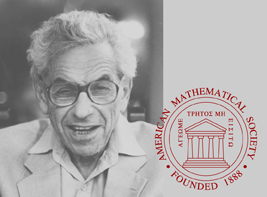By Guy Spriggs
In late March 2010, two conferences will come together when the University of Kentucky hosts the Spring Southeastern Sectional Meeting of the American Mathematical Society (AMS) and the Annual Meeting of the Kentucky Section of the Mathematical Association of America (KYMAA).
 The events on March 26, 27 and 28 will mark the first time UK has hosted a sectional meeting of the AMS since 1994 and the first return of the KYMAA since 2001. Organizers in the Mathematics Department at UK have worked hard to bring the meetings to Lexington and overlap events for one weekend. “It was definitely not a coincidence,” said UK associate professor of mathematics Alberto Corso.
The events on March 26, 27 and 28 will mark the first time UK has hosted a sectional meeting of the AMS since 1994 and the first return of the KYMAA since 2001. Organizers in the Mathematics Department at UK have worked hard to bring the meetings to Lexington and overlap events for one weekend. “It was definitely not a coincidence,” said UK associate professor of mathematics Alberto Corso.
The process of planning the events began back in 2007 when UK offered its availability and applied to be a host for the two separate conferences. “There’s a waiting list, so it took a long time to get things going,” Corso said. “Overall we expect 650 participants, so it’s been a big challenge to make sure that all the logistics are in place.”
The response has been encouraging: professors and students from UK, as well as from other institutions, have submitted proposals for presentations and special sessions throughout the weekend. “There will be a tremendous amount of activities. We really are trying to bring lots of good scholars,” Corso said.
The AMS and MAA are two of the professional societies for mathematicians. The AMS concentrates on research and issues relating to graduate education while the MAA is more concerned with teaching and undergraduate education.
The conferences being hosted at UK are sectional events, meaning that they are organized by geography rather than by topic. The AMS meeting is a gathering of the organization’s southeastern section and will draw faculty from across the country, with the majority coming from neighboring states. The KYMAA events will bring faculty and students from institutions across the state of Kentucky.
As part of the AMS Sectional Meeting UK will host the Erdös Memorial Lecture, part of a series of talks named after renowned combinatorist Paul Erdös.
Spending the latter half of his life traveling from university to university and living out of a suitcase, the late Erdös was the recipient of over 15 honorary doctorates and published more than 1,400 mathematical articles. Erdös’s high output of publications led to the creation of the Erdös number, a method of classifying mathematicians based on their connection to Erdös similar to the trivia game Six Degrees of Kevin Bacon. Paul Erdös alone has an Erdös number of zero, and his co-authors have Erdös numbers of one, with Erdös numbers increasing by one with each subsequent link.
“The lecture is named after Erdös because of his great influence on various fields of mathematics,” said Corso, who has an Erdös number of 4, meaning that he is four steps removed from Erdös.
The Erdös Memorial Lecture is funded by Andrew Beal, the Dallas-based founder of Beal Bank and an involved mathematics enthusiast. Doron Zeilberger, a professor of mathematics at Rutgers University with an Erdös number of 2, will present his talk entitled “3x+1” on March 27.
While most events during the weekend are technical talks aimed at mathematics professors and researchers, Zeilberger’s talk is intended for a broader audience. “It is intended to be a public lecture,” Corso said. “It should be an entertaining event as well.”
To set the stage for the weekend, the Mathematics Department also scheduled its annual Hayden-Howard Lecture. “Over the last ten years we’ve brought in a great variety of distinguished mathematicians for this talk,” Corso said.
The lecture will be delivered by David Eisenbud (Erdös number of 2), a professor of mathematics at the University of California at Berkeley and former president of the AMS.
In addition to the Erdös and Hayden-Howard Lectures, the weekend will feature 26 special sessions, four invited addresses, and presentations and workshops for teachers and researchers.
The events on March 26, 27 and 28 are hosted by UK’s Department of Mathematics, but the meetings are also sponsored by funds provided by the Department of Statistics and the Department of Physics and Astronomy, as well as the College of Arts & Sciencesand the Vice President for Research at UK.
Information on the event, including a complete schedule and directions to UK, can be found here.
Read a blog post on the Six Degrees of Paul Erdös.
